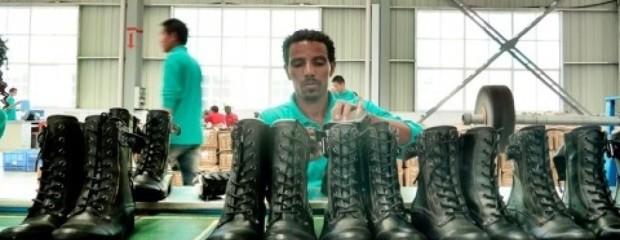Eight Business benefits of resuming economic relations between Ethiopia and Eritrea – By Tony Carroll

 Ethiopia and Eritrea ceased business relations upon the commencement of the border war in 1998. While a small amount of barter trade still exists, it is fair to say that trade relations between the two countries are non-existent – this is very much to the detriment of the private sectors in both countries (and across the region).
Ethiopia and Eritrea ceased business relations upon the commencement of the border war in 1998. While a small amount of barter trade still exists, it is fair to say that trade relations between the two countries are non-existent – this is very much to the detriment of the private sectors in both countries (and across the region).
Since the closure of the border, the economic fortunes of Ethiopia and Eritrea could hardly have been more divergent. While both remain poor countries in terms of per capita wealth, Ethiopia has been among the fastest and growing countries in the world averaging a steady 10% per annum growth for the past nine years. Conversely, as per the chart below, Eritrea has suffered vast fluctuations in its economic growth from a low of – 9% in 2008 to the 2012 level of + 7.5%.
GDP Growth over the years (“Eritrea Country Report.” Global Finance).
| Year | Real GDP Growth in Percentage |
| 2001 | 8.8 |
| 2002 | 3 |
| 2003 | -2.7 |
| 2004 | 1.5 |
| 2005 | 2.6 |
| 2006 | -1 |
| 2007 | 1.4 |
| 2008 | -9.8 |
| 2009 | 3.9 |
| 2010 | 2.2 |
| 2011 | 8.7 |
| 2012 | 7.5 |
Ethiopia has also been a leader in Africa in terms of infrastructure development, especially in the construction of roads, power infrastructure and water supply. Eritrea has endeavoured to rebuild its transportation infrastructure after the border war but progress has been slowed by inaccessibility of finance. In terms of education, Ethiopia has built dozens of institutions of higher education in the past 10 years and has begun to develop a work force that is increasingly in demand by manufacturers from Turkey, China and India. Despite promising signs of self reliance immediately after Independence, Eritrea continues to find its work force diminished due to emigration and military service.
Last, Ethiopia is rapidly modernizing its domestic and export agriculture whereas as Eritrea still relies on subsistence methods of production – albeit while eschewing food aid.
As a business consultant who has worked on investment in both countries, I am confident that a comprehensive settlement of disputes that underlie the 1998-2000 border war and normalization of economic relations will create myriad benefits, including:
- Increase in road, rail and port infrastructure in Eritrea. With assistance from the Chinese, Ethiopia has expended billions on building its transportation corridor to Djibouti. However, for many regions in Ethiopia, Eritrean ports are closer.
- Increase in power infrastructure and opening of export markets. By combining their respective sources of power, hydroelectric, wind and geothermal, Eritrean and Ethiopian consumers would benefit from lower costs and greater reliability of supply.
- Reduced power and transport costs would increase manufacturing investment in both Ethiopia and Eritrea. Although Ethiopia remains one of the world’s most expensive countries in terms of road transportation costs, there have been a swath of new manufacturing ventures in textiles, apparel and leather goods, driven by low labour costs and increased skill training.
- With its port access, Eritrea could also become a manufacturing hub, perhaps even adding strategic value to raw or semi-processed materials coming from Ethiopia.
- Renewed access to the US market under the Africa Growth and Opportunity Act (AGOA). In 2004, Eritrea was deemed ineligible for market access benefits offered and while the impact was minimal at the time, Ethiopia has been able to substantially grow its exports to the US in the past five years. The normalization of political and economic relations with its neighbour would not in itself restore AGOA eligibility, but it would demonstrate progress toward that end.
- Increased convertibility of currencies. Normalization of economic relations would allow the establishment of banking relations, now non-existent between the two countries. The Nakfa is among the world’s least convertible currencies and an open and transparent exchange with the Ethiopian birr could lower transaction costs for all businesses and consumers.
- Return of the commercial sector. As a result of the border war, Ethiopian businesses were expelled from Eritrea and vice versa. This bar has constrained companies from both countries to achieve scale. Moreover, among the most dynamic business communities in Ethiopia for generations were those of Eritrean origin.
- Fostering regional integration. Africa is striving to integrate its markets and Ethiopia has been leading in this process by establishing agreements with its neighbours for power and transportation corridors. There has been speculation that Ethiopia seeks membership of the East Africa Community. EAC membership would also provide benefits to Eritrea.
As reported by my friends Ambassadors Cohen, Shinn and Lyman, this appears to be a moment of inflection in the relationship between Eritrea and Ethiopia. Certainly the implementation of the border agreement and the resumption of commercial relations will not be an easy process. However, the economic benefits that would accrue to both countries could be substantial and should motivate leadership in both to expedite the process.
Tony Carroll is Vice President of Manchester Trade and Director of Acorus Capital.







Simply Hilarious, the title of the article should of been, ‘look at ethiopia, the fastest growing economy & Eritrea the slowest growing economy’, looks like your talking on behalf of the ethiopian government.
No matter how many lobbyist the ethiopian government hires, to paint a bleak image of Eritrea, it will never change the Truth & Reality on the ground. In this day an age, where information is readily available, you can not just simply lie, and expect to getaway with it, as you lose crediblity once the Truth has been told.
Of course, your intention is to hide and down play the success of Eritrea, who is infact the one of the fastest growing economy of the world, despite the fact that Eritrea has been illegally sanctioned and it’s territories occupied, where as aid addicted ethiopia, with the billions of dollars in aid it receives, is still one of the most poorest in the world.
So it’s quite hilarious to see someone comparing the Self-reliant Eritrea, with the aid addict ethiopia, and tries to make it look like ethiopia is doing better, simply hilarious:-)
This is simply a cheer leading for Ethiopia
The way you presented it, it looks like Ethiopia is all set as it is and any relationship with Eritrea would not add any value.
So, why bother?
Your attempt to present the grimmest picture of Eritrea, is so apparent, so much so that any one can read the pain you are feeling because some previous a ambassadors are talking about positive things about that part of out world
Simply pathetic
The question any one could not help but ask is: if Ethiopia is doing all the progress you and your likes love to preach, and is doing fine with out the whole Eritrea, then why in Gods name is Ethiopia holding a small Eritrean sovereign land, going to the extent of violating international law? What is the benefit in doing that?
And why in Gods name are you people cheering for injustice?
@ Ayte Haki.
Now we know who is really barking like “Beverly Hills Chihuahua”.
http://en.wikipedia.org/wiki/Beverly_Hills_Chihuahua
ha ha ha ha . . . .
@observer
Did they let you out of the psychiatric ward or something, this is not ‘dogsarguments’, it’s ‘africanarguments’, so please go to the dog’s forums & go bark there.
Our esteemed editor seem to have noticed that the majority of the comments appearing in this forum are mostly that of cadres defending the lunatic in Asmara and his greedy generals, so he sets out to lure more of them to make his site appear more vibrant than it actually is; the result is nothing more than a feast of nonsensical garbage for his targeted audience!
He claims to have worked as a business consultant both in Addis and Asmara? Yeah yeah, we are supposed to believe that there are such moronic “investors” who would pay him for shamelessly lobbying for these Asmara greedy generals. The only “investors” who would pay for your service are the greedy Asmara generals you are lobbying for WITHOUT WIT OR SHAME!
I can’t say whether this rubbish is more annoying than it is disgusting. This guy dare tell us that “Asmara could become manufacturing hub, perhaps even adding strategic values to raw to semi-processed materials coming from Ethiopia.”
Now, can you please tell us why in the world Addis would send its raw materials to Asmara so that value can be added to it??? Why would we do that when our precious brothers and sisters are leaving the country in droves in search of a job?? Is that because Asmara has a larger population than Addis? My God, STUPID doesn’t even begin to describe the rubbish this guy wants to spit on us!
” The most dynamic business communities in Ethiopia for generations were those of Asmara origin.” I hail from the Gurage ethnic group okay, so shut up! Don’t freaking tell us to let them exploit the business community they no longer wanted to be a part of if they cannot exploit it! We don’t care how much they paid you, be it in money or in kind, don’t you ever dare tell us that they can have it both way!
We lost precious brothers in the border war those greedy Asmara generals imposed on us, but we didn’t let the sacrifice of the war to go to waste, and put an end to the exploitation of our resources in the name of FALSE BROTHERHOOD! Forget little barren Bademe, this is our greatest victory of the war, and nobody can take it away from us!!!!!!
Thanks but no thanks, we are more than qualified, and blessed with abundant population, to add value to our own raw materials, while creating jobs at home and protecting our precious brothers and sisters from those sadist Arabs.
So our response to your rubbish that is devoid of any wit or shame is: GET LOST!!!!
@Addis Alem.
Spot on! If Gujarati’s are for India, then Gurage’s are to Ethiopia. I do not know when and where those folks (Eritreans) became the ‘most dynamic business communities’ in Ethiopia – they probably owned some left-over Italian Pastries. But the author’s overall impression is indeed laughable!!!
Ethiopia providing raw materials so Eritrea can process and add value is a dangerous economics! I do not know what the author is smoking – but that thinking from Eritrean side is indeed one reason for the brutal conflict! It will never happen!!! Eritrea can process its own raw materials, if it has any! Ethiopia has its own industries, sufficient enough to add values to its own raw materials. Eritrea can only serve as a port – that’s all there is to it! Tigray region of Ethiopia alone has a lot more industries than Eritrea at this point! Eritrea is still mesmerizing about the old beer and shoe factories Mussolini built half a century ago! Let them live in their nostalgia!!!
Observer,
I am speaking from first hand experience here.
I remember staying in a hotel in the tourist town of Lalibella, watching in aguish all these brand new Toyota Land Cruisers, every single one of them brandishing the greedy Asmara License Plate Number! Imagine the cold hard currency they were here to amass selling Ethiopian tourist attractions, while we stood on the sidelines selling entry tickets for a goddamn miserable 30 Ethiopian birr!
Remember how Asmara at one point exported more Ethiopian coffee than Ethiopia itself? How about Ethiopian leather? How about the electronic shops that had to close in Addis because they just couldn’t compete with the greedy Asmara dudes who flooded the market with “smart products with smart price”?
Of course what the Asmara greedy generals and their lobby mean by economic cooperation is the same old blatant economic exploitation! This is exactly why they want to be independent; what they mean be independence is the right to exploit Ethiopia.
As one bright Oromo brother told Meles to his face, this is not going to work for Ethiopia! He told Meles this talk of colonization … and independence … was a big lie! We never told them they can only go until the six grade like true colonizers do!
It’s all about greed, and more greed, and we are tired of it!
… anguish …
The writer is delusional. You can’t talk about economic in the worlds 2nd poorest country.
“Top 10 Poorest Countries 2013: Oxford University”
# 2. ETHIOPIA
90% Living In Poverty
39% Living On At Least $1.25 A Day
61.5% Deprived Of Adequate Schooling
83% Deprived of Electricity
http://www.ophi.org.uk/wp-content/uploads/Global-Multidimensional-Poverty-Index-2013-8-pager.pdf?18be84
Dear Editor,
I think you failed to mention the reality between Ethiopia and Eritrea. First of all if a country choose to live by itself no need to depend on others , well there was miscalculation how they control the economy of both country, that is a done deal. Second of all Ethiopian and Eritrean economy moving in different direction, so there is no need to back 20 years and negotiate to bail out Eritrea.
In any circumstance under current regime of Eritrea, Ethiopia wouldn’t benefit any thing from Eritrea. Dear editor unless you have a plan ,let us say investment on the ports and looting money from both, your mediation to come to benefit both country, is far from reality. Finally i would like to mention one thing that the people of both country, they are brother and sisters, we respect each other and one day we will live together as before with out ‘ foreign’ hands. Next time please write unbiased story.